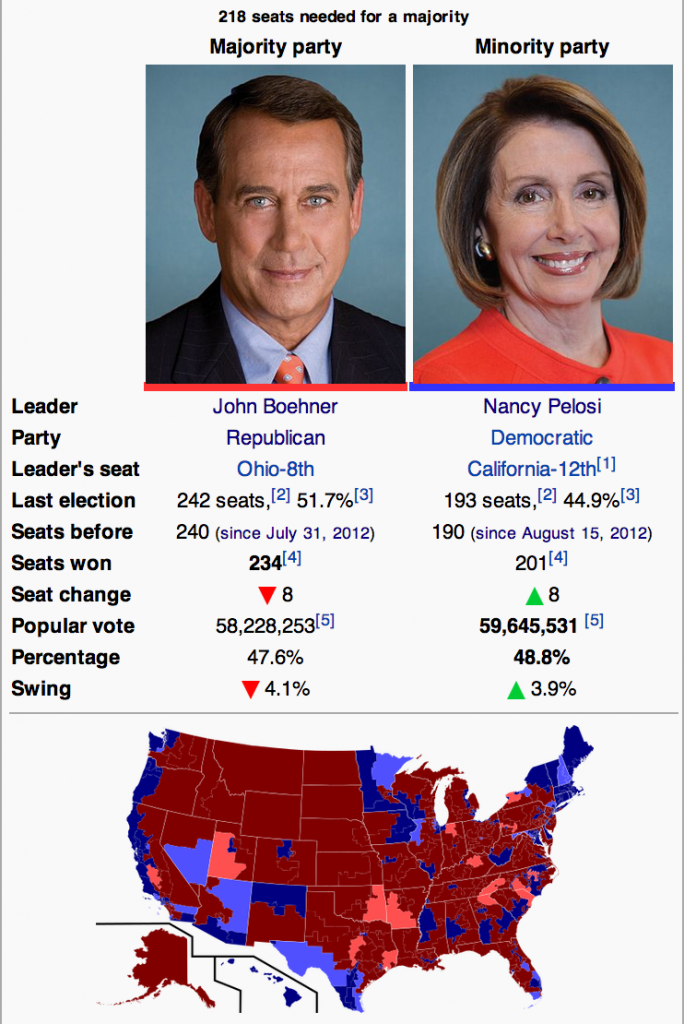It’s weird that there isn’t nearly as much discussion of gerrymandering as other U.S. governance reform problems. In 2012, the share of U.S. House seats Republicans won outperformed their popular vote share in the collective House races (versus number of seats won) by about 6 full percentage points. Had the GOP’s vote share actually gone as high as their seat share they would have received about 7 million more votes nationwide than they actually won.
Democratic House candidates collectively won 1 percentage point of the vote more than the House Republican candidates yet remained in the minority. This has only happened a few times in the past century. A virtual tie that slightly favored the Republicans in the number of seats would still have been possible under fair districting — but not such a wide margin as we see now.
We’ll talk about the issue of unfair districting on this week’s Arsenal For Democracy radio episode, but there’s another glaring problem: Democrats aren’t focusing enough on taking the steps necessary to correct the districting imbalance that’s hurting them so badly. That would boil down, essentially, to investing a lot of money right now into the state parties of every Democratic-leaning state, swing state, and Republican-trending-Democratic-demographic state in the country to recruit, train, and finance candidates in state legislative races and governor races in 2014, 2016, 2018, and 2020.
If executed well, Democrats would be in a position to reasonably expect in 2020 (barring some catastrophic political wave against them that year) to win a lot of majorities in state legislatures all over, to prevent Republicans from extending the post-2010 maps that have been so weighted against Democrats in Congressional races. At the very least, Democratic-led legislatures could implement fairer, nonpartisan redistricting systems that take away the self-serving bias of having legislators redraw their own districts.
When Republican social conservative scolds complain about liberals being hedonists who don’t understand the importance of delayed gratification via strategic present action, the lack of Democratic focus on the problem of gerrymandering and redistricting is the kind of thing that makes them look like they might actually have a point.
Republicans got so mad about Roe v. Wade in 1973 that they hatched and executed an elaborate multi-decade plan to gradually fill massive numbers of lower court seats with hardline but upwardly-confirmable anti-abortion judges, positioning them for future Supreme Court nominations, eventually resulting in a takeover of the Supreme Court a full 32 years later (2005). This patient effort and careful step-by-step strategy is now paying off massively on multiple policy issues.
Meanwhile, Democrats are too distracted by the 2016 presidential horse race to definitively hold the Senate this year, let alone make a play for the House or many legislatures and governorships.
We’re going to panic in October 2020 — right before the election that will determine the next round of post-census redistricting nationwide — when we suddenly realize we needed 3-4 cycles (e.g. starting 2014 or 2016) to ramp back up toward legislative majorities in a lot of states by election night in November 2020. That year will be a presidential year when the Democratic base really turns out, unlike in the 2010 non-presidential cycle. But it won’t make a bit of difference if the state parties all over the country haven’t recruited electable legislative candidates. They’re going to need consistent national Democratic support for the next six and a half years to make that happen.
Without that effort, Democrats can look forward to another ten years of Republican domination on multiple levels or full-stop obstruction of all Democratic agenda points.



